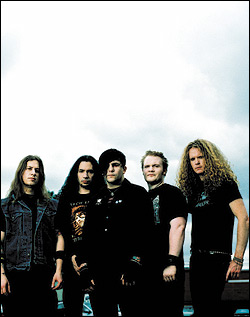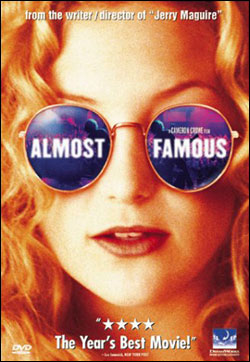“On my signal, unleash hell.” You know that one. Russell Crowe growls it in that Oscar-winning Australian-Roman accent before many a punk-ass infantryman gets run through in Gladiator. The catchphrase doubles as the voice mail of Himsa’s black-hooded “whisperer/screamer” Johnny Pettibone, which poses a few intriguing Psych 101 questions: Is the frontman metaphorically trumpeting his own calling to lead his metalcore quintet to “war”? Is Pettibone an admirer of obscenely talented assholes, or perhaps one himself? Most curious of all: Why is the author of this feature pathologically obsessed with how the poor guy chooses to employ his answering service?
My answer is probably as simple as Pettibone’s: I called him for an interview three weeks ago and wound up doing the loop-de-loop in Maximus voice-mail hell. Not like he didn’t have a good excuse—Himsa’s bus crapped out in South Carolina and weary-but-accommodating bassist Derek Harn was the only longhair not completely crashed out in a cheap motel. Actually, the conversational musical chairs were appropriate in more ways than one. Harn was the only man in the room who had been there from the beginning, co-founder of a beloved local outfit that has already seen 13 members in just six years.
Things were looking up, however briefly. Himsa had just embarked on their biggest tour to date, opening for veteran gore fiends Cradle of Filth, and were on their way to Tampa, home of death-metal pioneers Morbid Angel, whose bassist was planning to give Harn a customized Dean guitar. Naturally, the fuckin’ bus breaks down. Nothing like missing your second show in the first six days of a major-league metal tour, marooned in a state so red you’d think it rained blood all summer.
“There’s some guy selling pecans in a wood shack out on the road where the hotel is,” Harn observes. “Other than that, there’s not a whole lot.”
Himsa live to unleash hell at the snap of a finger, but life was giving them a much less favorable manual gesture this morning.
It’s an accomplishment of the highest order that the boys have a bus to lament at all. If you’re a casual Seattle indie fan, you may have caught Himsa’s careening, classicist thrash at the Paradox, the Old Firehouse, or the occasional Graceland CD-release party (Pettibone supplements his bank as a bouncer there when not on tour). If you’re a religious viewer of Fuse’s Uranium or MTV’s Headbanger’s Ball, Himsa are white-hot future stars, riding metal’s latest diverse surge of popularity right alongside Killswitch Engage, Hatebreed, Damageplan, Atreyu, and Mastodon. Their two-year-old LP, Courting Tragedy and Disaster (Prosthetic), is still hemorrhaging heavily censored videos formerly ripe with suicide imagery, the latest of which is the darkly evocative “Girl in a Glass.”
“All our friends were getting on MTV and getting videos, and it was just like, ‘Oh, well, we could do that. That’s easy to do,'” Harn shrugs. “People still just know us as this small band that plays at the Paradox or whatever, and now that they see us on TV and we’re out doing big national tours and stuff, it’s strange [for them]. It’s easier for us to adjust because every time we go out, we go with different bands who keep painting different pictures for us. We’re subscribing to the Slayer methodology of metal.”
This plan of attack—staying true to your sound, paying your dues, taking it on the road, keeping it real, seeing what happens, a zillion other clichés—pays slow dividends. When Himsa return to Seattle, four of the five members will essentially be homeless. Only guitarist Kirby Charles Johnson has a lasting relationship, which was established well before the band’s inception. Harn is sinking further and further into debt with every tour. For a band whose moniker means the opposite of a Sanskrit term for refusing to inflict injury upon the body, indulging in the rock-and-roll double life makes perfect sense.
“For all this exposure, we’re still struggling,” Harn concedes. “We joke about how we’re total rock stars to all of these kids. We [opened for] Shadows Fall last time, and we were signing autographs the entire time. I don’t think I’ve ever felt like, ‘Whoa, I need to get that person’s autograph,’ but it’s just a form of flattery. At one point, I started having kids sign stuff back to me.
“TV does weird things to people,” he sighs.
It’ll only get more surreal. Himsa are tentatively planning to hop aboard Ozzfest’s second stage next summer, which would—as MTV’s guilty pleasure reality series Battle for Ozzfest constantly reminds us—yield unprecedented exposure. Ironically, the increasingly chic descriptor “metalcore” applies less to the ultramelodic metal-pop they’ll be playing than to Himsa themselves—at essence a former hardcore band embracing their metal influences.
“I hate it. I can’t stand it,” Harn moans of the metalcore trend. “There are ways you can do it that aren’t so obvious as putting two songs together, like here’s the first half that’s the hard part and the chorus that’s like some super emo part. It’s not good songwriting, in my opinion.
“We do have melodic parts; we just don’t have singsongy parts. Because . . . ” his voice lowers as if to let me in on a secret the whole world is quickly becoming privy to, ” . . . we’re not pussies.”
Himsa play the Premier at 6:30 p.m. with Cradle of Filth, Bleeding Through, and Arch Enemy. Tues., Nov. 30. $25.







